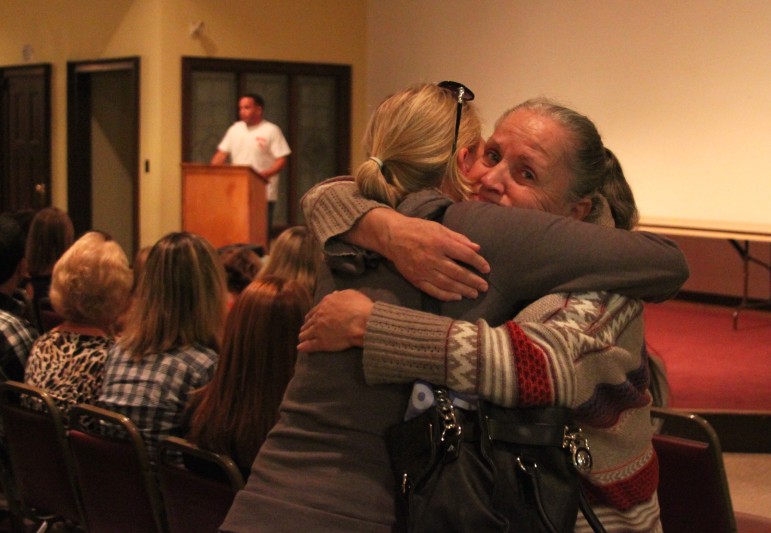
Charlie Breitrose
Carol Morris, right, receives a hug after talking about losing four children to drugs during the Watertown Overcoming Addiction Candlelight Memorial Vigil.
{Updated Feb. 16, 2018 at 4:43 p.m.}
A slideshow showing people posing with buddies, graduating or holding a young baby seems like it represents the good times, however, each photo shown at Wednseday’s candlelight vigil had two dates – the year of birth and year of death. Each picture showed someone lost to heroin and other opiates.
Hundreds of people packed the lower hall at St. Patrick’s Church for the first Candlelight Memorial Vigil organized by Watertown residents committed to stopping the opiate crisis in town. Many watched the slideshow with tears streaming down their faces, remembering love ones they had lost.
Recovering addict Pete Airasian, founder of Watertown Overcoming Addiction, and Wendy Clark Morrissey, who lost her brother to heroin, had the idea to hold the vigil.
“This epidemic is killing a generation, and it is on our doorstep,” Airasian said.
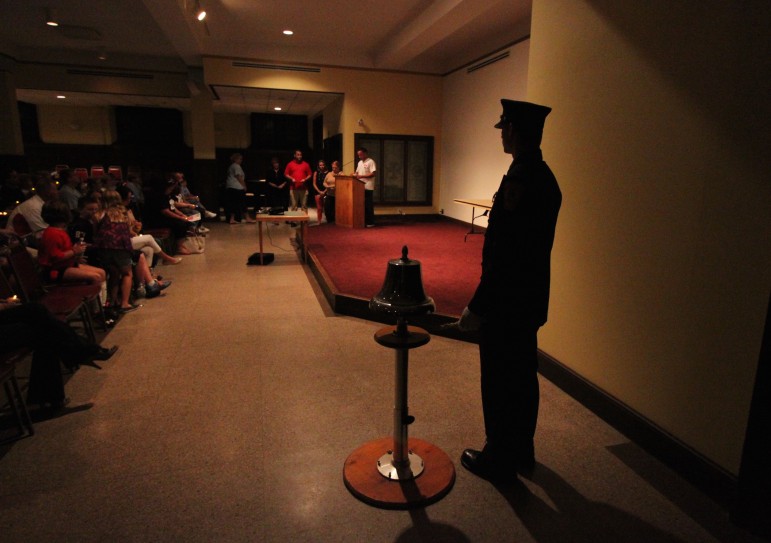
Charlie Breitrose
Watertown Firefighter Glen McManus rang the bell each time the name of someone who died from drug addiction’s name was read.
Though opiates have been around along time – Airasian said he knows people who lost loved ones in the 1960s, he has seen the number of deaths growing and the victims getting younger.
Speaker Karen Kobza knows the pain of losing a loved one. She lost her brother to addiction, despite the efforts of Kobza and her sisters to get him clean.
“My sisters and I confronted him and told him, ‘You just have to stop!” Kobza said. “He was good at sweet talking us and would say, ‘OK, I am going to stop.'”
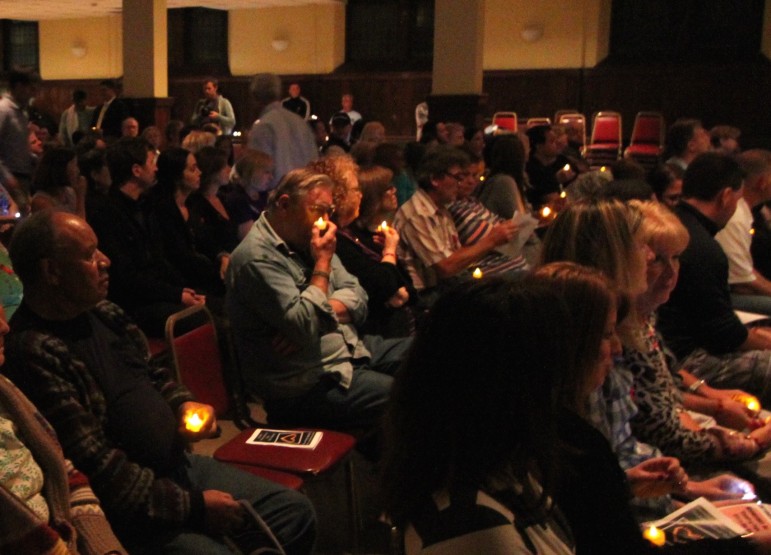
Charlie Breitrose
Hundreds came out to the Watertown Overcoming Addiction Candlelight Memorial Vigil at St. Patrick’s Church.
The drug does not discriminate, she said. Her brother was 25 and had a good job working in the telecommunications industry. Kobza and her family watched, however, as her brother lost friends, his job and a place to live.
He was not alone. In Massachusetts 1,500 people died from overdoses last year, and this year nine Watertown residents have died this year from drug overdoses. She quoted a study that said 22 million Americans are addicted to some substance. Columbia University study puts it at 40 million.
“It’s the number one health problem,” Kobza said.
No one knows the loss of a child to drugs better than Carol Morris.
“I lost four children to addiction,” she said. “The word pain goes to the mother. People think you bury them and the pain fades away, but the pain never goes away. I lay awake at night, and think about them countless times throughout the day.”
Morris encouraged people to go after those providing the drugs.
“Go to the police, talk with a detective. Talk to Pete (Airasian),” Morris said. “I know someone knows who they are. They are selling them the drugs.”
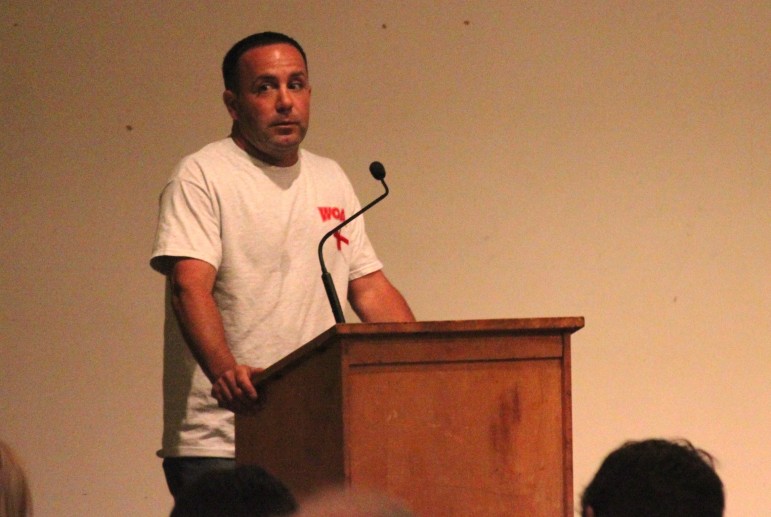
Charlie Breitrose
Pete Airasian helped organize the first Candlelight Memorial Vigil in an effort to stop the heroin and opiate crisis in Watertown.
A recovering addict, talked about how strong a grip opiates can have. He has been struggling with addiction for 22 years.
“A counselor asked, ‘Would you die for your kids if you had to?’ I said ‘Happily,'” he said. “He said, ‘But you can’t stop doing drugs.’ It shook me apart.”
Even after vowing to get off drugs, he relapsed.
“I remember saying, when my kids come home I am not going to do drugs. I am going to be with them,” he said. “They walked in the door and within two minutes I was doing 100 miles per hour to get drugs and get high.”
Finally he detoxed and is trying to live a normal life.
“I am getting my soul back,” he said. “If you see someone struggling, reach out to them. Don’t judge them.”
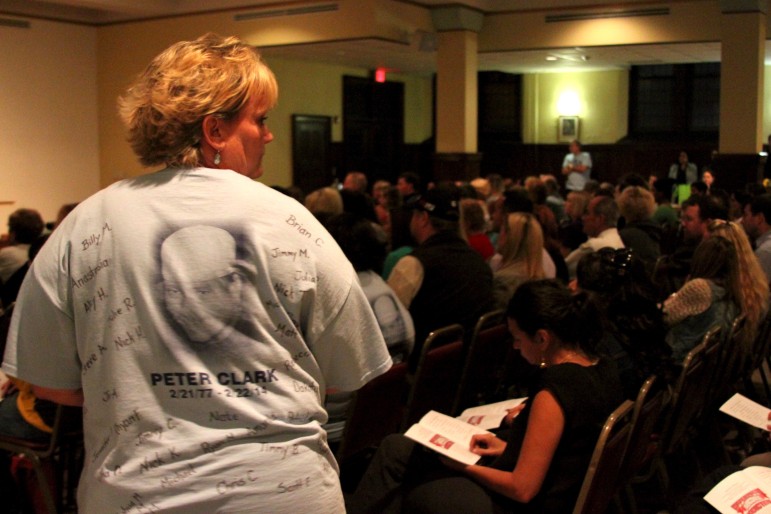
Charlie Breitrose
Wendy Clark Morrissey started Watertown Against Substance Abuse to support family of addicts after her brother Peter died from an overdose. She helped organize the vigil.
At the end of the program, Airasian and others read out hundreds of names of people who died from drugs. With each name, Watertown Firefighter Glen McManus rang a bell.
Airasian said this will not be a single event, but the first of many. He said more needs to be done to help people kick addiction, such as longer treatment, more beds for people detoxing and longterm treatment.
“One voice will not change things, but a room like this, a community coming together, will,” Airaisan said. “Talk with your state rep.”
{Ed. Note: The name of one of the speakers was removed at the request of a family member.}
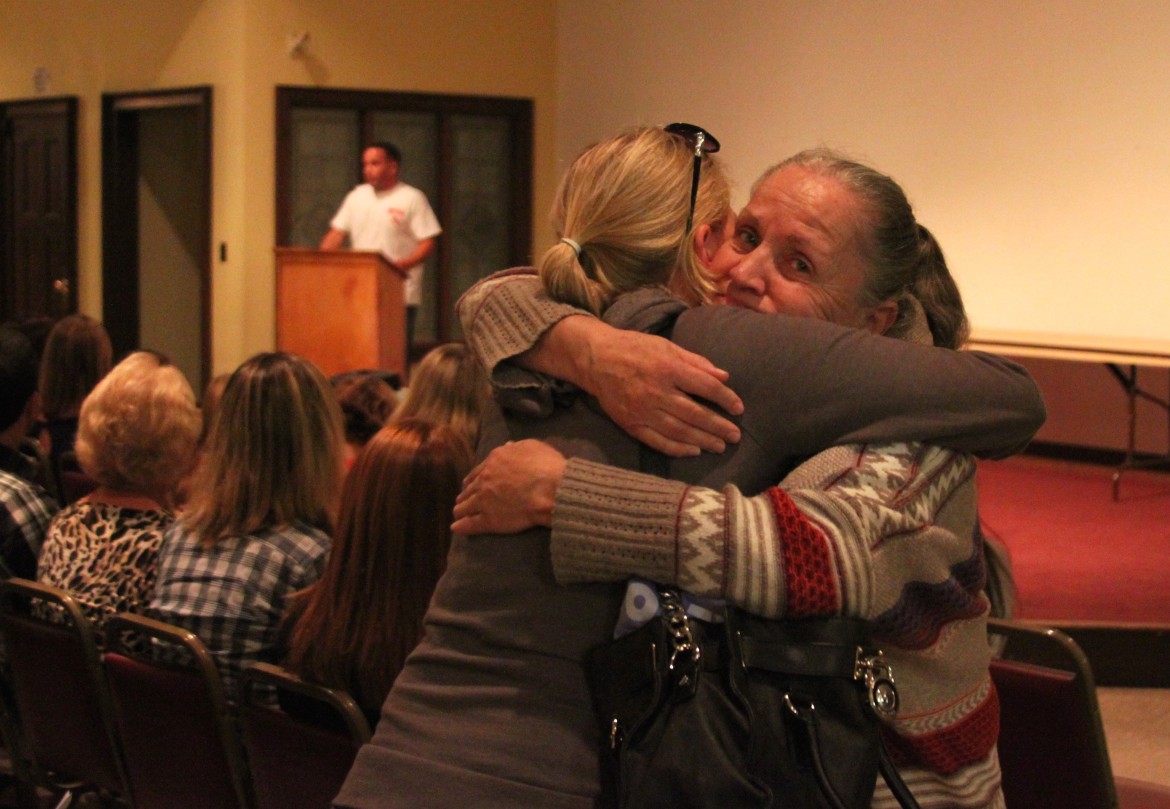
That’s awesome that the community is coming together and share with each other….It’s so true how a community and people coming together can make a difference… good work Pete Airasian…